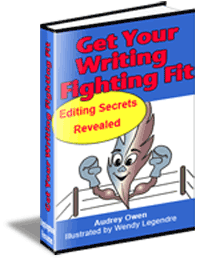10 Quick Creative Writing Fixes
Highly Recommended
 |
Why are creative writing edits so brutal? You’ve finished your first draft of a killer short story, you’re really excited about it, and now it’s time to ruin all that enthusiasm and good feeling with a ruthless editing session. It doesn’t have to be that painful... Think of editing your writing the way you think about deadheading your flowers. You’re not destroying your work; you ‘re just making it prettier. Before you start trimming out entire paragraphs, killing side characters, and changing the flow of your entire piece however, go through your text and perform these ten quick editing fixes, then assess where you are: - Rewrite any sentences that start with ‘there’. There shouldn’t be any sentences that start with that word. In fact, strike that last sentence. Rewritten version: The word ‘there’ is unnecessary and weakens the impact of any sentence when placed at the beginning.
- Break run on sentences into two or three short ones. Often, when the words are really flowing it gets hard to stop and so writers just keep adding ‘ands’ and ‘buts’ and so on until their sentences are so long that readers get lost in them and they really shouldn’t do that. Or, put more succinctly: Run on sentences are common in first drafts. Eliminate them.
- Kill your adverbs. The suffix ‘ly’ is the cockroach of creative writing. Your job as a creative editor is to stamp out ‘ly’ wherever you find it. “Janet ran hurriedly to the car,” is much weaker than “Janet hurried to the car.” “Janet darted to the car,” is better than either one of those sentences.
- Spell Check. Trivial, maybe; but fail to do this on a regular basis and no publisher will ever take you seriously.
- Cut your clichés. If you’ve ever taken a creative writing class, you know the pain of seeing the words “Trite” and “Hackneyed” written in red in the margins of your beloved text. Do that to yourself when you edit and the pain will stop. No character can be “hard as nails.” No night can be “dark and stormy.” Think of a more original way to say those things.
- Put the back-story in the back. Lots of first draft creative writing projects start out by describing the main character’s history and motivations. The first few paragraphs need to be active and draw the reader in. All that other stuff should come later, or not at all. Now that you see where you are going with your story, rewrite the back-story as action or bury it in the middle.
- Show your reader; don’t tell your reader. This quick editing fix may not feel very quick when you first try it, but with practice it becomes a skill, not a rare or elusive talent. When you come across passages explaining your character’s motivations, have your character do or say something that makes those motivations obvious instead.
- Read your dialog aloud. Some writers excel at dialog, but many struggle with it. One popular trick is to read all your characters’ dialog out loud and then quick edit what they are saying so that it sounds more natural.
- Go easy on the adjectives. Adverbs are cockroaches, but adjectives can be your friends so long as you are selective, even picky about them. Don’t take home just any old adjective. Get to know each one thoroughly and carefully, and be very cautious about making a commitment. Can you say it better with a verb? Can the shimmering moon turn into “the moon shimmered”?
- Read the entire piece aloud. One of the best quick creative writing edits around is to just read your text out loud to yourself or a trusted friend. Writers become immersed in their work and even great writers can and do lose sight of the obvious. If your plot is sketchy or a character is unreal, that will come out when you read aloud.
After you perform these quick editing fixes, you should have a better idea of how close you are to a finished piece. You could be finished already! No, probably not. Let’s not get carried away. But it's a good start. Get Your FREE Ebook How To Write And Get Paid For It when you join our mailing list. Related Articles: Ready for Rewriting... How To Edit Your Writing By Elaborating... Return to Edit Your Writing
|
